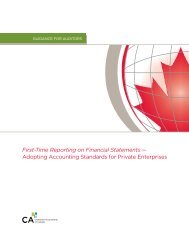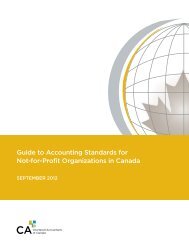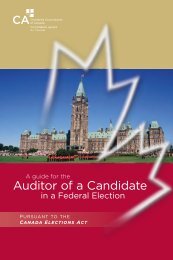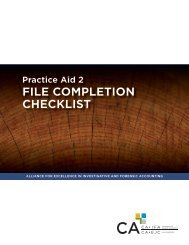20 Questions Directors of Not-for-Profit Organizations Should Ask ...
20 Questions Directors of Not-for-Profit Organizations Should Ask ...
20 Questions Directors of Not-for-Profit Organizations Should Ask ...
You also want an ePaper? Increase the reach of your titles
YUMPU automatically turns print PDFs into web optimized ePapers that Google loves.
Selection <strong>of</strong> <strong>Directors</strong><br />
1.<br />
What are the requirements <strong>for</strong> electing or<br />
appointing directors<br />
Finding the right people to serve as directors<br />
is usually the job <strong>of</strong> the board as a whole or<br />
its governance committee, 4 which proposes<br />
candidates <strong>for</strong> election. However, this is not always<br />
the case. Some organizations use processes such<br />
as a call <strong>for</strong> nominations to identify candidates. A<br />
government, political or other organization may<br />
also appoint directors.<br />
However director selection is done, the objectives<br />
<strong>of</strong> the process should be as follows:<br />
• To identify the required knowledge, skills and<br />
experiences;<br />
• To select qualified individuals who are free<br />
from conflicts <strong>of</strong> interest and committed<br />
to serving and overseeing the organization<br />
effectively;<br />
• To achieve diversity <strong>of</strong> board members<br />
appropriately reflective <strong>of</strong> the community and<br />
constituencies served by the organization; and<br />
• To achieve continuity through a smooth<br />
succession <strong>of</strong> board members (including<br />
board and committee leaders) that balances<br />
new ideas and energy with experience and<br />
“institutional memory”.<br />
Preparing <strong>for</strong> the Selection<br />
Process<br />
Be<strong>for</strong>e beginning a search <strong>for</strong> potential directors,<br />
the governance committee should have a clear<br />
understanding <strong>of</strong> its task. This section describes<br />
the points the committee should consider in<br />
preparing <strong>for</strong> the search process:<br />
• The requirements <strong>for</strong> electing or appointing<br />
directors<br />
• The composition <strong>of</strong> the board, including the<br />
knowledge, skills and experience <strong>of</strong> incumbent<br />
directors<br />
• The mandates <strong>of</strong> the board and its committees<br />
• The position descriptions <strong>for</strong> board roles<br />
• The specific skills, experiences and personal<br />
qualities required by the board and its<br />
committees in members and chairs.<br />
4<br />
In this document, the term “governance committee” is used<br />
<strong>for</strong> any committee or individual(s) responsible <strong>for</strong> the selection<br />
or nomination <strong>of</strong> candidates <strong>for</strong> election or appointment<br />
to a board <strong>of</strong> directors. It includes “nominating committee”.<br />
One <strong>of</strong> the first steps in designing a director<br />
selection process is to understand how the<br />
organization is set up 5 . NPOs can be established in<br />
a variety <strong>of</strong> ways, including:<br />
• incorporation under its own specific statute,<br />
e.g., Institute <strong>of</strong> Chartered Accountants <strong>of</strong><br />
British Columbia, Canadian Red Cross Society;<br />
• incorporation under a statute that covers a<br />
type <strong>of</strong> organization such as corporations,<br />
societies, cooperatives, schools, hospitals,<br />
etc.;<br />
• establishment as a charitable or non-charitable<br />
trust; and<br />
• establishment as a government agency.<br />
The applicable legislation and the organization’s<br />
constating documents (incorporating document,<br />
constitution, by-laws, etc.) set out the<br />
requirements regarding the powers, composition<br />
and selection <strong>of</strong> the board <strong>of</strong> directors. Apart<br />
from ex-<strong>of</strong>ficio appointments (directors who serve<br />
on a board by virtue <strong>of</strong> holding a position), there<br />
are two primary methods <strong>for</strong> selecting directors:<br />
appointment and election. These may be used<br />
individually or in combination.<br />
Appointments are generally made by or through<br />
funding agencies, which may be governmental<br />
or private. Governments may appoint members<br />
to boards <strong>of</strong> self-regulating organizations whose<br />
activities affect the public interest, such as lawyers,<br />
accountants and school teachers.<br />
Elections may be made by the members <strong>of</strong> an<br />
organization, by members <strong>of</strong> the public (e.g., school<br />
boards), or by members <strong>of</strong> a designated constituency<br />
(e.g., residents <strong>of</strong> a condominium, employees <strong>of</strong><br />
an organization, etc.). Candidates <strong>for</strong> election may<br />
be identified through a call <strong>for</strong> nominations, by a<br />
governance/nominating committee that presents<br />
a slate <strong>for</strong> approval by the membership, or a<br />
combination <strong>of</strong> both.<br />
In some organizations, the only members are the<br />
directors, who may be appointed by an outside<br />
body or elected by the board.<br />
5<br />
There is a good description <strong>of</strong> organizational <strong>for</strong>ms and their<br />
significance <strong>for</strong> board selection in Appendix B <strong>of</strong> Governing<br />
<strong>for</strong> Results by Mel Gill.<br />
4

















